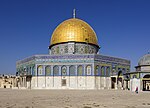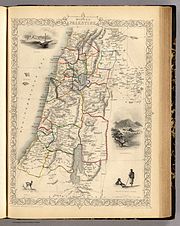Our website is made possible by displaying online advertisements to our visitors.
Please consider supporting us by disabling your ad blocker.
History of Palestine
This article may be too long to read and navigate comfortably. When this tag was added, its readable prose size was 19,000 words. (February 2023) |
| History of Palestine |
|---|
 |
|
|
Situated between three continents, the region of Palestine has a tumultuous history as a crossroads for religion, culture, commerce, and politics. The region was among the earliest to see human habitation, agricultural communities and civilization. In the Bronze Age, the Canaanites established city-states influenced by surrounding civilizations, among them Egypt, which ruled the area in the Late Bronze Age. During the Iron Age, two related Israelite kingdoms, Israel and Judah, controlled much of Palestine, while the Philistines occupied its southern coast. The Assyrians conquered the region in the 8th century BCE, then the Babylonians in c. 601 BCE, followed by the Persians who conquered the Babylonian Empire in 539 BCE. Alexander the Great conquered the Persian Empire in the late 330s BCE, beginning Hellenization.
In the late 2nd century BCE, the Hasmonean Kingdom conquered most of Palestine, but the kingdom became a vassal of Rome, which annexed it in 63 BCE. Roman Judea was troubled by Jewish revolts in 66 CE, so Rome destroyed Jerusalem and the Second Jewish Temple in 70 CE. In the 4th century, as the Roman Empire transitioned to Christianity, Palestine became a center for the religion, attracting pilgrims, monks and scholars. Following Muslim conquest of the Levant in 636–641, ruling dynasties succeeded each other: the Rashiduns; Umayyads, Abbasids; the semi-independent Tulunids and Ikhshidids; Fatimids; and the Seljuks. In 1099, the Crusaders established the Kingdom of Jerusalem, which the Ayyubid Sultanate reconquered in 1187. Following the invasion of the Mongol Empire in the late 1250s, the Egyptian Mamluks reunified Palestine under its control, before the Ottoman Empire conquered the region in 1516 and ruled it as Ottoman Syria to the 20th century, largely undisrupted.
During World War I the British government issued the Balfour Declaration, favoring the establishment of a homeland for the Jewish people in Palestine, and captured it from the Ottomans. The League of Nations gave Britain mandatory power over Palestine in 1922. British rule and Arab efforts to prevent Jewish migration led to growing violence between Arabs and Jews, causing the British to announce its intention to terminate the Mandate in 1947. The UN General Assembly recommended partitioning Palestine into two states: Arab and Jewish. However, the situation deteriorated into a civil war. The Arabs rejected the Partition Plan, the Jews ostensibly accepted it, declaring the independence of the State of Israel in May 1948 upon the end of the British mandate. Nearby Arab countries invaded Palestine, Israel not only prevailed, but conquered more territory than envisioned by the Partition Plan. During the war, 700,000, or about 80% of all Palestinians fled or were driven out of territory Israel conquered and were not allowed to return, an event known as the Nakba ("Catastrophe") to Palestinians. Starting in the late 1940s and continuing for decades, about 850,000 Jews from the Arab world immigrated ("made Aliyah") to Israel.
After the war, only two parts of Palestine remained in Arab control: the West Bank (and East-Jerusalem), annexed by Jordan, and the Gaza Strip occupied by Egypt, which were conquered by Israel during the Six-Day War in 1967. Despite international objections, Israel started to establish settlements in these occupied territories.[1] Meanwhile, the Palestinian national movement gained international recognition, thanks to the Palestine Liberation Organisation (PLO), under Yasser Arafat. In 1993, the Oslo Peace Accords between Israel and the PLO established the Palestinian Authority (PA), an interim body to run Gaza and the West Bank (but not East Jerusalem), pending a permanent solution. Further peace developments were not ratified and/or implemented, and relations between Israel and Palestinians has been marked by conflict, especially with Islamist Hamas, which rejects the PA. In 2007, Hamas won control of Gaza from the PA, now limited to the West Bank. In 2012, the State of Palestine (the name used by the PA) became a non-member observer state in the UN, allowing it to take part in General Assembly debates and improving its chances of joining other UN agencies.
Previous Page Next Page





